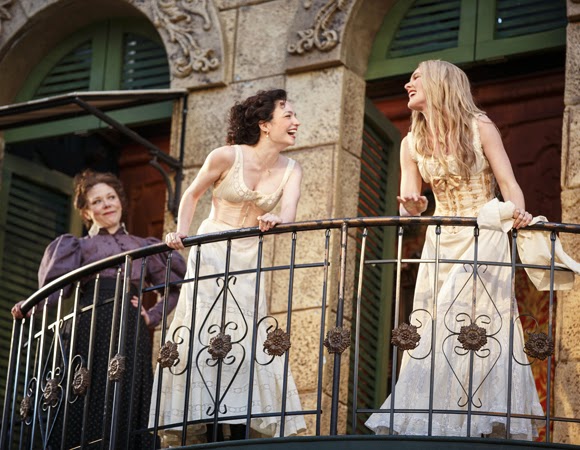It’s Only a Play is funny. Extremely funny. And it ought to be. Some of the funniest actors in the American
firmament get together and do comedy routines one after another, get a lot of
laughs, and call it a play. But no. The actors are polished professionals with
heart, and if the audience had a lick of sense the comedy might not be as
painfully long as it is, but the starstruck audience applauds when the curtain
opens, when the wonderful but unknown Micah
Stock enters and they’ve no idea who he is.
They applaud some more when Nathan
Lane enters, and when Megan Mullally
enters, when Isabel Keating enters (stepping
in for Stockard Channing), when Rupert
Grint enters, when F. Murray Abraham
enters, and when Matthew Broderick
enters. The annoying audience stops the
action every time they do that, and when you blow the timing in comedy, you
blow the whole routine. I swear, if they
just stopped treating the theatre like a comedy club or a cabaret, It’s
Only a Play might come in at two hours instead of two and a half.
But for all my grousing about it not being a play, were it
not for the multi-star contracts doubtless in place, It’s Only A Play would
probably run forever. The audience loves
it. The cast is superb and Jack O’Brien’s
direction sharp and brisk and right on the mark.
As the wunderkind British director of the play that
thankfully does not appear within the play,
Rupert Grint enters dressed as a Carnaby Street peacock with a crested
carrot top. The character sometimes crawls
under a large black net — shades of Harry Potter’s invisibility cloak — in order
to disappear, and at one point in the second act, that worked so well that I
forgot he was there, thinking he’d left the stage. Not a good sign. But Mr. Grint — as well as Isabel Keating,
understudy to Ms. Channing — is not at the level of Ms. Mullally or Messrs. Abraham,
Broderick, Lane, and even young Mr. Stock.
Matthew Broderick
did himself charmingly, Megan Mullally
was pitch perfectly annoying and lovable and sweet and dizzy. F.
Murray Abraham played opposite to his usual villainy and was very funny as
a foppish, foolish, envious theatre critic.
Nathan Lane takes a character
with a tired premise and rises to the heights of great comedic acting.
Essentially the playwright wrote a formulaic comedy with stock
characters: a typical playwright from another time, a typical TV actor who left
the theatre ten years before, a typical drug-addled movie star exiled from Hollywood
and trying to make a comeback on Broadway, an obnoxious, foul-mouthed, British
wunderkind director, a star-struck actor looking for his big break collecting
coats at a Broadway opening party. All
in all, it’s rather like, hey my dad has a barn, let’s put on a show in black
tie and tails.
But it’s funny.
After the first quarter hour, I started to suffer from snide
name-dropping overload and wondered how often Terence McNally will have to rewrite to keep the names topical. This was all nastily funny, but made me think
more of a weekly comedy show on television than a star-studded play on Broadway.
When it’s said that a play must have a beginning, a middle
and an end, that doesn’t mean it begins at 8 o’clock, ends at 10:30 and has a
break for booze and bathroom visits somewhere in the middle. No, it’s the story that needs to begin and
progress to a conflict thence to a point of crisis around the middle then fall
apart or resolve itself by the end of the story. It is certainly the case that with some plays
it’s hard to immediately recognize the ending, partly because we’re
unaccustomed to hearing it ourselves after years of watching films that go
black, credits rolling, music swelling and sometimes even the words “The
End.” Onstage it’s not necessarily as
blatant as these slaps in the face, especially Irish plays that may end in
irresolute resolutions. But within a
moment of that uncertainty, it’s an ending. 10:30 p.m. is not an end.
At any rate, the dog was genius, the actors perfect and
hilarious, the direction brisk, the play slowed down primarily by the annoying
audience …although the last scene does go on a bit longer than it ought.
The scenic design did not rate applause at the opening, but
was perfectly serviceable. Again, the
actors and direction are terrific, but Mr. McNally, funny as all his lines are,
was a tad disappointing, because It’s Only a Play is not.
~ Molly Matera,
signing off to re-read Aristotle’s Poetics.









